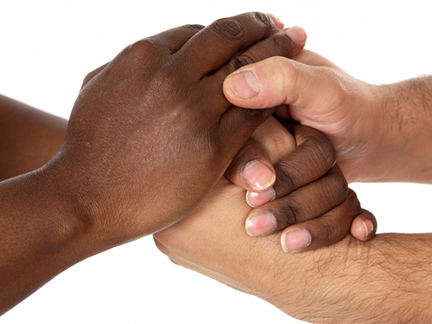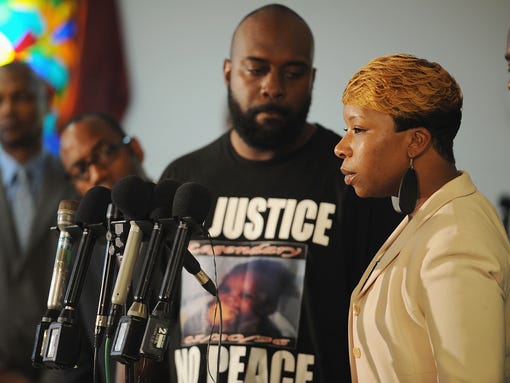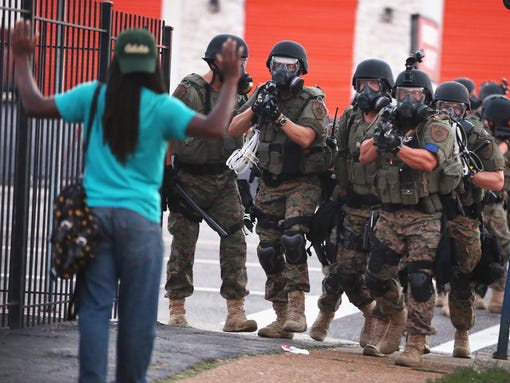Over the past few days, our nation's attention has once again been turned to the topic of race. This time, it was because of violence that began when a group of white nationalists gathered in Charlottesville, VA for a rally. Counter-protests soon formed, and over the weekend 3 people lost their lives, including one woman who was hit by a car that drove through one of the counter-protests.
 |
| White Supremacist rally in Charlottesville, VA (Aug 2017) |
For many white Americans, this all may seem baffling. Some white Americans are still amazed that such hate still exists. Meanwhile, others still find a way to shift the focus and blame onto groups like "Black Lives Matter." Still others point to the decision made in Charlottesville to remove a Confederate statue a few months ago as the inciting incident.
But, events like Charlottesville are merely the tip of the iceberg. It's not as if racism hasn't been pulsing throughout our country this whole time. The reason so many whites have a difficult time dealing with situations like this, or only speaking up against racism when it reaches this level of obviousness is that we don't usually have to think about race because of white privilege. When you benefit from white privilege, it's also harder to see that same privilege. It becomes your culture and your worldview, and as such is difficult to notice until you have an encounter with other cultures and stories.
So, what I hope to do in this post is speak to my friends of European descent. I think one reason white people struggle to handle topics of race well is that we are not trained to see racism. And when we are smacked in the face with it, or when others ask us to give up some of our privilege to pursue an equal society, we tend to get uncomfortable or even defensive and hostile. So, in this post, I want to share a few of the ways in which I have seen racism rear its ugly head so my white friends can begin to get just a sliver of a taste of how racism remains present with us in every community.
So, here are a few of my stories. As a disclosure, most of my personal observations relate to racism as it pertains to the black community since those are the interactions my journey has taken me to. However, if you just ask around a bit, you can easily find others who can better speak about stories relating to Hispanic, Native American, Asian, or other cultures.
I also offer up that these are only what I have seen as a white male. Because of my own whiteness and status, I have personally experienced far less than my black and brown brothers and sisters, and even things that have happened in my presence I am less likely to notice because I am a white male. However, perhaps that underscores the point even more. If I have seen this much in a few short years as a white male, how much more is actually going on that others go through every day?! Anyways, here is what I have seen:
- Just recently, a local black church in our area was broken into and vandalized, including with graffiti of a swastika and the words "Trump" and "Satan."
- I lived in small Texas town for about 6 1/2 years and served as a youth pastor for 5 years while there. Thankfully, our youth ministry was pretty diverse with near equal numbers of white, black, and Hispanic students. Within my first two months there, we had 2 of our black students who were walking home after church on a Wednesday night and had a person from a neighboring church shout "niggers" at them.
- I've heard white members of a past church catch themselves using the N-word to refer to some of our black students.
- When we had a white student visit one Sunday, we had one lady tell my wife and I that she was happy to see that student and that we "need more white kids."
- I have gotten complaints from some church members that some of our (black) students would wear a backpack to church service, but never heard any complaints when white students would do the same.
There's also more subtle things I noticed:
- While many white members of past churches I've been to felt free to express their political opinions, including disparaging remarks about Obama, I can't say our black students (many of whom supported Obama) ever felt the same freedom to make political comments, likely because they felt in the minority and feared reprisal based on other comments they heard condemning their points of view.
- In Texas, "Juneteenth" is a holiday celebrating when slaves in Texas received word that they were free. While there are numerous events, parades, and celebrations for this holiday, and despite the fact that nearly all the black churches in town would get involved, I never heard any suggestions from our white churches should do something for Juneteenth. It either didn't matter to them or simply wasn't on their radar.
- When events like the Charlottesville protests or the Charleston church shooting occurred, many white churches do not even acknowledge such events during their worship, despite a willingness to bring up other non race-related tragedies in worship services. (Thankfully, my current church incorporated a time of mourning and prayer in today's service for the events in Charlottesville.)
Then there's the history of towns I've lived in.
- Like most southern towns, the schools of a town I recently lived in were segregated in the past. The black school and the white school only merged in 1968, within my parents' lifetime.
- After desegregation in the late 60's and economic downturns in the following decades, my last town experienced the phenomenon of "white flight" as many (richer) white citizens chose to leave town in search of better (and whiter) pastures. This further hurt the city's economy and the many families of color who remained.
- As I would drive through the town in which I served as youth pastor, I quickly noticed a huge difference in the architecture of the churches in town. The largest, tallest, and nicest churches were historically white. Whereas most of the black churches in town were much smaller, less ornate, and looked more run down. Now of course, the measure of a church is not in its building, but in its people, but this noticeable difference speaks to the historic inequality that has existed in the incomes and opportunities between the white and black citizens of our town.
- Although segregation officially ended in the 60's, towns I have lied in are still segregated by geography. In my last city of residence, what is known as "the south side" is almost exclusively black (with a fair number of Hispanic families now as well). Incidentally, this also happens to be the poorest part of town with abysmal infrastructure. Roads are hardly paved, many lots are overgrown, and houses are older and smaller. Meanwhile, the students in my youth ministry referred to neighborhoods where I lived as "the white part of town." This did not necessarily mean that there were only white people in our neighborhoods (for instance, we had 3 black families on my street), but it was because it's where you found the white people. And in the past, these areas would have been exclusively white as African Americans would have been prohibited (by cost and by law) from buying or even renting these homes. Not surprisingly, these were the parts of town with nicer houses and better roads. I have seen this same phenomenon in countless cities I visit in central Texas as a part of my current job. Often, the phrase "wrong side of the tracks" has a very literal meaning, even in small towns of less than 10,000 people--and the side you are on is often partially determined by race.
- And an unofficial segregation still exists in the schools in that same county in which I used to live. Even though whites make up about 40% of the city's population, the city school district is probably 90-95% black and Hispanic students. So, where do all the white kids go? Well, they go to surrounding school districts that are supposedly "better" academically, even though test results don't always bear this out.
- But, the reputation of this school district as an academically poor school is also tied to its reputation as a "black" school. For instance, when one of my white friends who was a counselor at our school district went to watch her son (also white) play a basketball game at a neighboring school, the people doing admission automatically directed her to sit with the opposing team's section because they couldn't imagine a white person sitting on our side. There was an implicit assumption that our school (and basketball team) would be black and that a white player would not be playing on our team.
But before you just assume that this one town is some horribly racist town, realize that such instances of racism and privilege are common all over the place:
- One of the most eye opening experiences on race I've had came a number of years ago when I was in seminary. I was going on a school retreat (that doubled as a preaching class). During this retreat, one of my classmates, who is black, told us a story about an experience he had the morning he left to drive out to the conference site. We were reading several novels and books for the class, and my classmate still had to pick up one last book. So, he got up early the morning the retreat began and drove to a local bookstore. He arrived a few minutes before they opened, so he sat in his car and waited (since it was a cold January morning). Within a few minutes, he had a police officer come up and knock on his window. The officer began to interrogate him about why he was waiting around and what he was doing. Even though my classmate was also a youth pastor like me and had a legitimate reason for being there, he had an experience that I would likely not have, all because he was a black man wearing a hooded sweatshirt. Apparently a black man sitting outside a bookstore is planning on robbing the place because surely he's not there to actually buy books (sarcasm).
- As shocking as this is, it gets even worse. As we talked about this experience, another black student chimed in and asked, "Did the officer 'apologize' by saying that they had had a report of another black man in the area who matched your description?" My classmate who had been questioned by the officer replied by saying that that's exactly what the officer said. At this point, a third student (also a black male) nodded and affirmed that he's had the same experience (multiple times). Again, I have never had this experience, but all 3 of my classmates had (again, multiple times). And, it's not that these three were troublemakers or anything. All of them were pastors and had families and held good jobs before going to seminary. That evening, each of these three proceeded to share several of their stories of being pulled over or stopped by the police despite not doing anything wrong. For example, one was stopped and questioned intently by an officer when he was driving a van for a country music radio station he worked for (perhaps the officer thought the van was stolen since surely a black man couldn't work at a country music station--again sarcasm).
- This past fall, one of my interns at work (who was also a college student) told me a story about she witnessed a group of white males had shouted a bunch of racial slurs and insults at a female Muslim student on the college campus following the election of Donald Trump. This is in addition to an incident in which a black student was called a N***** on Baylor's campus.
- When I was searching for an apartment a few months ago, I did so with the knowledge that the options for minorities when it comes to buying and renting homes has historically been limited. There have been so many structural ways in which minorities (blacks in particular) have been prohibited from buying homes or renting homes in particular neighborhoods (read The Color of Law by Richard Rothstein for more on this). And since the past impacts the present, this means that the sins of the past continue to impact the housing options and geography of today.
- When I was in school, we learned about the "big moments" as it related to race--slavery, the Civil War, Martin Luther King Jr., Brown v Board of Education--but there were so many aspects of our racial history that were never even touched. For instance, we learned about the GI Bill, but not about how most of the benefits of GI Bill disproportionately helped white veterans and left black veterans out to dry. We did not learn about the many ways in which our housing markets and neighborhoods were intentionally segregated. We did not learn how the 13th Amendment (supposedly banning slavery) left a big loophole allowing slavery as a punishment for a crime and that southerners in the post-Civil War era made up ludicrous crimes in order to arrest African Americans and force them to do work they had just been freed from. For that matter, we did not learn that racism was just as prominent in businesses and society in the north as in the south. We did not learn about the contributions of black employees at NASA in getting to the moon (as depicted in the film Hidden Figures). And worst of all, we were taught to view racism as an historical issue, one that largely ended during the Civil Rights movement. These are matters in which I am only now beginning to educate myself about. But, I am also actively seeking out this information because I've personally seen how racism is still alive and well. This means that most white Americans are still blissfully unaware of these historical (and modern) realities.
So, there are a few of my stories. The list could be much longer if I included the countless Facebook and social media posts and comments I've seen that have been racially insensitive. It could be much longer if I included the many in-person comments I've heard (including within the church) that demonstrate a complete lack of awareness and knowledge on the part of whites of how much racism has marred our country's past. And again, it would be much, much longer if I were not a white male and was actually the recipient of racism and bias.
I don't post these stories to badmouth anyone or to say that individuals guilty of racist comments or actions are always bad (some are very kind people who simply don't realize what they are doing). I post these stories to simply point out that racism and bias and white privilege do in fact exist today and that we cannot choose to inaction. And it's not just in random white supremacist rallies that happen to pop up. It's everywhere. It's in the north and in the south. It's in big cities and in small towns. It's in the world, and it's in the Church. And it's not merely a "few bad apples." Racism built our society. It laid the bedrock on which we now stand, and as such it continues to affect the present. Bias continues to be built into the social systems that benefit those of us who are white. We cannot ignore this anymore.
If you have your own personal stories you have experienced, I encourage you to share them. It's time for those of us who are white to stop trying to be "colorblind" and to realize that our society is not truly equal yet. "Colorblindness" might be a great ideal to strive for, but as long as racism and inequality continue to exist, those of us who are white cannot afford to ignore race because doing so simply gives us permission to continue benefiting from a system that is rigged against our neighbor.
















